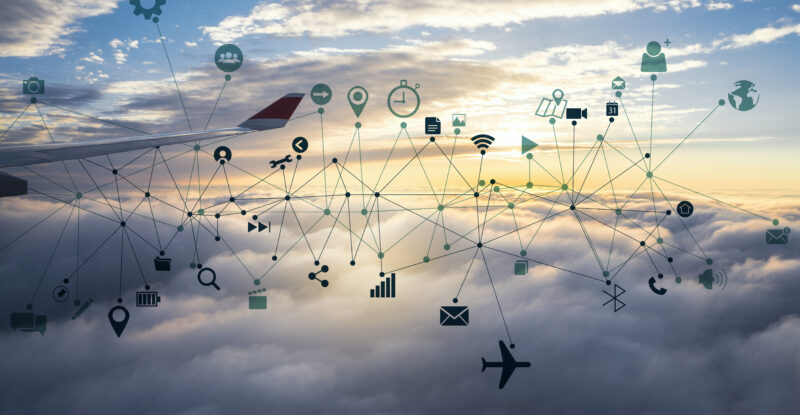Two activities on Capitol Hill involving personal electronic devices (PEDs) on board aircraft are garnering media attention today – the FAA’s issuance of a final rule disallowing pilots from using PEDs for personal use in all operations, and the House Transportation Committee’s decision to pass legislation that seeks to ban the inflight use of cell phones for voice calls.
The FAA’s final rule was not an unexpected action. You may recall how, in 2009, two Northwest Airlines pilots were reported to have overshot Minneapolis because they were working on a new crew scheduling program on their laptops, prompting the agency to take notice of pilot PED use in-flight. And indeed the FAA cites this incident a driver to its final rule today, saying, “Several incidents involving a breakdown of cockpit discipline prompted Congress to address this issue via legislation. In one instance, two pilots were using their personal laptop computers during cruise flight and lost situational awareness, leading to a 150-mile fly-by of their destination. In another instance, a pilot sent a text message on her personal cell phone during the taxi phase of the flight after the aircraft pushed back from the gate and before the take-off sequence.
“These incidents illustrate the potential for such devices to create a hazardous distraction during critical phases of flight. This rule will ensure that certain non-essential activities do not contribute to the challenge of task management on the flight deck and do not contribute to a loss of situational.”
The FAA’s final rule, which takes effect in 60 days, is more procedural than anything else; it codifies existing FAA policies and procedures and meets an FAA Modernization and Reform Act of 2012 mandate by prohibiting all commercial airline (passenger and cargo) flight crews from using personal wireless communications devices or laptop computers for personal reasons during all aircraft operations.
The agency notes that its 1981 “sterile cockpit” rule already forbids pilots to engage in distracting behavior during critical phases of flight, including take-off and landing, “and we have previously asked carriers to address the distraction issue through their crew training programs. The rule reflects current flight deck operating procedures and imposes minimal cost to the airlines.” Pilots will continue to use airline-approved PEDs for electronic flight bags (EFBs).
However, as previously reported on Runway Girl Network, even though airlines prohibit pilots from accessing Wi-Fi for their own personal use (such as to check email or to access social media) – and indeed pilots can be fired immediately for such activities – enforcing these rules is another thing altogether. A pilot who flies for Gogo Wi-Fi-equipped carrier says it’s not uncommon for pilots to access Gogo on their own devices. ALPA previously declined to discuss the issue, telling us, “If it’s not something that’s going to effect safety or the quality of the workplace or quality of flight for passenger, it’s not something we’ve got a statement on at this moment; in the future we may have.”
In a separate action today, the US House Transportation Committee approved a bill that would ban cell phone calls in-flight. The bill – sponsored by Congressman Bill Shuster, and tabled after the FCC proposed expanding inflight connectivity options to include mobile services – is not the first of its kind. Lawmakers previously tried – and failed – to pass “Hang-Up Act” legislation.
Most carriers seem to believe that they should be able to decide whether or not to permit inflight voice calls (and not legislators), though some have vowed not to permit it even if the ban is lifted.
Delivering perhaps the strongest anti-voice messaging to customers is Delta Air Lines, which has unequivocally stated it will not permit cellular calls, or voice over IP (VoIP) via its inflight Wi-Fi service. We have every reason to believe that Delta is deadly serious. The carrier’s current agreement with Gogo already requires the inflight connectivity provider to do everything in its power to prevent VoIP calls on board. If passengers find a way to circumvent Gogo’s VoIP blocks – as some do – then it is Gogo’s responsibility to make revisions to the system at its own expense and stop the activity “as expeditiously as is possible”, according to the pact.
JetBlue has also made its intentions loud and clear, recently saying it would ban cell phone calls if the FCC permits their use, and likewise has opted to prohibit VoIP calls even though its superfast inflight Wi-Fi service, dubbed Fly-Fi, can support such high-bandwidth functionality. Curiously, the carrier went a step further, reportedly telling NBC News that it has “no plans on installing the cellular transponders that would allow cellular calls”.
Meanwhile, these carriers’ international partners already have the freedom to offer inflight Wi-Fi together with inflight mobile connectivity. Delta’s joint venture partner, Virgin Atlantic, permits voice calls, but must switch off the service when it enters US airspace due to the FCC’s current ban on mobile connectivity. Go ahead and Google “Virgin Atlantic” and “voice calls” and see what you find – nary a complaint about the service. Middle Eastern carriers have no qualms about offering voice functionality; Emirates, Etihad Airways, Oman Air and Qatar Airways offer the service.
“Airlines that have our [system] are flying to the US every single day with thousands of US citizens using our services. Today, we’ve not had a single complaint,” says Ian Dawkins, CEO of OnAir, which provides mobile connectivity to Oman Air, Qatar Airways and others. “People talk about banning it, but at the end of the day we have airlines around the world who have decided it’s their choice.” Part of that choice, by the way, is to “switch off the service at night”, as not to disturb sleeping passengers.
Featured image credited to istock.com/ozgurdonmaz












